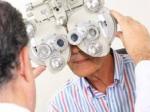


Specialized Centers
HOSPITAL CLÍNICO VISTAHERMOSA
HOSPITAL INTERNACIONAL MEDIMAR
VISSUM CORPORACION OFTALMOLÓGICA
Definitive Visual Correction (DVC)
Presbyopia is a condition whereby the ageing process causes the lens to lose its ability to focus the eye, making it difficult to see close objects clearly. Over the years, it can also affect distance vision.
Definitive Visual Correction (DVC) can correct advanced and fully evolved cases of presbyopia while at the same time eliminating defects such as hypermetropy (long-sightedness), myopia (short-sightedness) and astigmatism.
Benefits of the operation
Definitive Visual Correction (DVC) improves eyesight, especially in dim lighting conditions, corrects presbyopia and any short- or long-sightedness. This means patients need not wear spectacles for the rest of their lives, and they will never have cataracts.
After the surgery patients no longer need spectacles or contact lenses for most tasks (it improves intermediate distance vision: mobile phone, computer, domestic distances), restoring natural eyesight and improving vision quality and quality of life.
Medical-technical description
The DVC technique consists of removing the crystalline (lens) from the eye and implanting a latest generation artificial accommodative or multifocal lens. The technology is specific to induce improvement at all distances, including intermediate vision (computer and mobile phone).
About the operation
The operation takes about 20 minutes and is performed under local or topical (eye drops) anaesthesia. A tiny incision is made in the cornea through which the crystalline is removed and replaced by an intraocular lens that also corrects any existing sight problems, which is why it is called "definitive visual correction".
Before the operation
- Patients must refrain from wearing contact lenses for at least 7 days before the ophthalmological examination.
- A blood test and pre-anaesthesia study will be performed by a specialist.
- If you are taking any medication or you suffer from any illnesses, you must tell the ophthalmologist.
- You will be given some special towelettes with which you must clean your eyelids for four days before the surgery.
- You will use some eye drops three times a day on the day before the surgery.
Post-operative care
- You will continue to use the eye drops given to you by your doctor until you visit the ophthalmologist between 24 and 48 hours after the surgery.
- It is important you do not touch the eye on the first day and you must refrain from doing anything strenuous for five days and try not to rub your eyes.
- After 48 hours you can go back to your normal activities so long as you take the precautions advised by our professionals.



